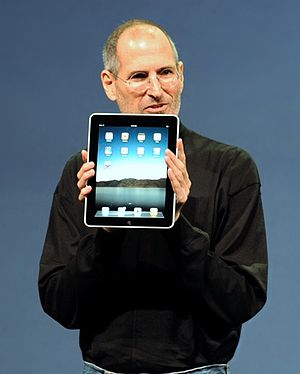| English: Apple iPad Event (Photo credit: Wikipedia) |
This series looks at a small snippet of The book on the Perfectionist Personality, aka The Obsessive Compulsive disordered Personality, aka OCPD,
each week. Please follow along, leave your comments, engage more on the
FaceBook website... whatever your heart calls you to do.
When Being in Control Gets Out of Control by Allan E. Mallinger, M.D.
and Jeanette DeWyze was published by Random House in 1992. If you
believe you are dealing with OCPD or someone who is "Too Perfect,"
whether that's you or a loved one, please buy a copy of the book and
read it for additional insights that will not all be covered in these
excerpts.
A man who loves life intensely must always be jealous of the few exquisite moments of leisure that he has.... His hours of fishing must be as sacred as his hours of business. ~LIN YUTANG, The Importance of Living
Work permeates every moment of Natalie's carefully planned schedule. An ambitious public prosecutor, she rises before dawn <snip> After dinner with her family, she invariably works for a few more hours. <snip> Even though her supervisor has urged her to drive herself less furiously, Natalie can't really imagine cutting back her work hours. "My job is like a vortex," she says flatly. "It draws me in."
The Obsessive Workaholic
Most people would call Natalie a "workaholic." Although this is not a psychiatric term, the recently minted word aptly describes a person a having a compulsive need to work. I t applies to many obsessives. For them, work represents much more than just a way to earn a living; it's the central axis around which everything else revolves.
Workaholism is more than just a matter of long hours. No one, for example, would label as a workaholic the impoverished immigrant who sews for eighteen hours a day. She probably has no psychological need to work so hard, and one assumes that were she to win the lottery, she would work less. When most people call someone a workaholic, they are implying that the person works significantly more than he or she has to or is even expected to.
My own definition is that a workaholic is someone who voluntarily devotes practically every waking hour to either doing or thinking about some form of work (though he may not realize his actions are voluntary). This incorporates a very broad range of overly driven behavior. <snip>
In American society, we are very competitive about work. It's an area where being obsessive is not simply unnoticed, but often expected and praised.***
Because we can do something, doesn't mean we should. Yes, working more hours generally results in more money, which means we can buy more things. And those with OCPD tend to focus on things, rather than people.
There will always be more things to buy. Things are not going anywhere. People, experiences, and relationships, on the other hand, will not always be available to someone works his/her life away.
Take Steve Jobs. He helped bring a lot of cool gadgets to life, but in his personal life:
I wanted my kids to know me,' he told Pulitzer Prize nominee and author Walter Isaacson, when asked why he agreed to a tell-all book despite living a famously private life.
'I wasn't always there for them, and I wanted them to know why and to understand what I did,' he added poignantly at his home in Palo Alto, California.
| SINGAPORE - OCTOBER 06: An Apple Ipad 2 showing the Apple website displays a tribute to Steve Jobs, co-founder and former chief executive officer of Apple, at a store in Marina Bay Sands, Singapore on Thursday, Oct. 6, 2011. Jobs, 56, passed away after a long battle with pancreatic cancer. Jobs co-founded Apple in 1976 and is credited, along with Steve Wozniak, with marketing the world's first personal computer in addition to the popular iPod, iPhone and iPad. (Image credit: Getty Images via @daylife) |
I'm thinking his kids and his wife might have been able to suffer through life with a few less cool gadgets and a lot more time with the guy - but his work was clearly #1, and they were an afterthought, to be fitted in around the edges, if/when he could make the time. Failing that, well, now they can always read his biography on their iPads, after his death. That'll surely give them the same warm fuzzy feeling as actually spending time with their father, feeling not only that they knew him, but that he cared enough to know them, right?
Do you have a compulsive need to work?
Love someone who does?
Your thoughts?


